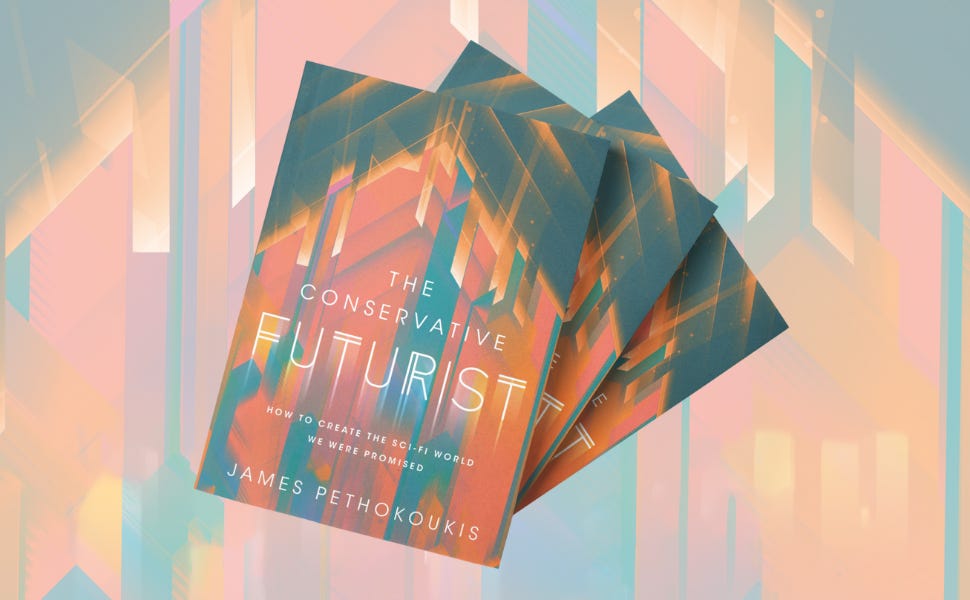🚀 Faster, Please! Week in Review #67
Please check out some great highlights from my essays and interviews!
My free and paid Faster, Please! subscribers: Welcome to Week in Review. No paywall! Thank you all for your support! For my free subscribers, please become a paying subscriber today.
Melior Mundus
Some shameless self-promotion: I have a new book out. The Conservative Futurist: How To Create the Sci-Fi World We Were Promised is currently available pretty much everywhere. I’m very excited about it! Let’s gooooo! 🆙↗⤴📈
In This Issue
Essay Highlights
— What's really at stake if we get AI regulation wrong
— Oh, no: Biden is learning about AI from movies. We're in deep trouble.
— Elon Musk: 'There will come a point where no job is needed. AI will be able to do everything.'
In Case You Missed It
— Colonialism isn't why Israel is rich and it's neighbors aren't
Essay Highlights
🤖 What's really at stake if we get AI regulation wrong
It’s not surprising that I’m concerned about President Biden’s new executive order on AI, about which White House aide Bruce Reed said in a statement: "Biden is rolling out the strongest” set of actions any government in the world has ever taken on AI safety, security and trust. It's the next step in an aggressive strategy to do everything on all fronts to harness the benefits of AI and mitigate the risks." My view: Premature and rushed AI regulation risks stifling innovation and cementing dominant companies, especially as the major players have the resources and clout to deal with new rules and to influence the shaping of those rules to their advantage. Regulators should show GREAT humility, given the limited understanding of generative AI's risks. Sure, governments should prioritize establishing structures to study AI, encouraging collaboration among existing regulatory bodies. Voluntary codes of conduct for AI model-makers can help manage potential threats. And then we can take it from there, dealing with problems in an informed and targeted way.
🤖🎬 Oh, no: Biden is learning about AI from movies. We're in deep trouble.
American presidents are just like you and me, at least in this way: They like movies. And those movies sometimes inspire thoughts and ideas. One favorite example is when back in 1985 President Ronald Reagan, right before an Oval Office address to the country, joked that Rambo: First Blood Part II showed him how to handle future hostage situations. “Boy, after seeing Rambo last night, I know what to do next time this happens,” he remarked, a comment picked up by microphones but not broadcast. (In the film, Sylvester Stallone's second-most famous character launches a violent rescue mission to save missing Vietnam War POWs.) In the case of President Biden, the (already) hoary plot device of a rogue AI may well have crystallized his growing concern about the emerging technology, concerns manifested in his 111-page “Executive Order on Safe, Secure, and Trustworthy Artificial Intelligence.” It’s a directive that I described in the previous issue of this newsletter as premature and both excessively broad and excessively detailed, risking harmful unintended consequences. The better-safe-than-sorry Precautionary Principle in action, again.
🤖 Elon Musk: 'There will come a point where no job is needed. AI will be able to do everything.'
As any Wall Street sharpie knows, if you have to make a forecast, use a number or a date — but not both. You can say “The Dow is headed to 50,000” or “The Dow’s best days are ahead of it,” but avoid “The Dow will hit 50,000 by the end of 2025” or some such. With that in mind, I’m not having a big reaction to Elon Musk’s telling UK Prime Minister Rishi Sunak at the Bletchley Park international AI summit that there “will come a point where no job is needed. You can have a job if you want a job . . . but AI will be able to do everything.” But notably, the entrepreneur didn’t offer a timeline indicating exactly or even approximately when no job would be needed. So what do we do with that?
In case you missed it:
🏡 Colonialism isn't why Israel is rich and it's neighbors aren't
Israel has the world’s 34th highest per capita GDP (adjusted for purchasing power parity) at around $36,000. (It’s also home to some significant technology companies and has about many “unicorn” startups as larger OECD economies such as Canada and Germany.) Israel is a Western country combining liberal democracy and market capitalism that just happens to be located smack dab in the Middle East. It’s neighbors aren’t doing nearly as well. If you look at the region based on the Fraser Institute index of economic freedom — which measures the freedom to make economic decisions, personal choice, voluntary exchange, freedom to enter markets and compete, and security of the person and privately-owned property — you can really see Israel as the lone representative of those democratic capitalist Western values and the prosperity they generate. One reason a poll that finds that a quarter of Americans aged 18 to 24 think Israel should be “ended and given to Hamas and the Palestinians” is so bizarre — and repugnant — is that Israel is the only country in the region that most of them would ever want to live in.










